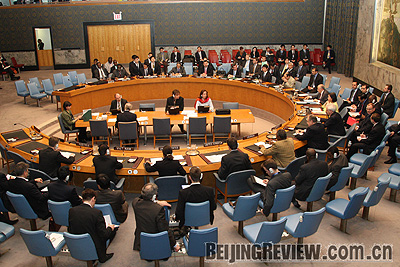|
 |
|
INTERNATIONAL RESPONSE: The UN Security Council holds a meeting on North Korea's launch on April 13, the day it released a presidential statement condemning the activity (LIU XIN) |
China has called for calmness on all sides in response to North Korea's announcement that it will withdraw from the six-party talks and restore nuclear facilities disabled under the agreements of the talks.
"We hope parties concerned bear in mind overall interests, exert calmness and restraint, and jointly maintain the process of the six-party talks," said Foreign Ministry spokeswoman Jiang Yu.
The six-party talks have played a positive role in promoting the denuclearization of the Korean Peninsula, providing a platform for
relevant countries to communicate and build trust, and exploring ways to create a peace and security mechanism in Northeast Asia, Jiang told a press conference in Beijing on April 14.
North Korea made the announcement earlier in the day, shortly after the UN Security Council issued a presidential statement condemning its recent launch. The country said it launched an experimental communications satellite on April 5, raising international concerns over its purposes.
In its presidential statement, the UN Security Council said North Korea's launch was "in contravention of Security Council Resolution 1718," while calling on Pyongyang to fully comply with its obligations under the resolution and demanding it not conduct any further launches. It will also "adjust" the sanctions imposed on North Korea according to the UN resolution.
Resolution 1718 was adopted in October 2006 following North Korea's nuclear test. The resolution provides that North Korea must "not conduct any further nuclear test or launch of a ballistic missile" and "suspend all activities related to its ballistic missile program." It imposes a series of economic and commercial sanctions against the country.
North Korea considers the UN Security Council's recent presidential statement "an unjust action" that infringes on its sovereignty and hurts the dignity of its people.
"There would be no need to hold six-party talks, which the DPRK [Democratic People's Republic of Korea] has attended," said the country's Foreign Ministry. "The DPRK will bolster its nuclear deterrent for self-defense in every way." It will restore nuclear facilities it has disabled and resume operating them, the ministry added.
The six-party talks involve North Korea, South Korea, the United States, Russia, Japan and China as a multilateral mechanism designed to resolve the North Korean nuclear issue. Hosted by China, the talks were first held in Beijing in August 2003.
Under an agreement reached in the talks, North Korea blew up the cooling tower at its Yongbyon nuclear complex in June 2008, marking a symbolic step forward toward denuclearization.
Talking is the way
Commenting on the UN Security Council's presidential statement, Jiang said China always holds that the reaction of the Security Council should be aimed at ensuring the overall interests of peace and stability on the Korean Peninsula and in Northeast Asia, promoting the six-party talks and the denuclearization process on the peninsula, and safeguarding the international non-proliferation regime.
In light of these principles, China disagreed with the Security Council in adopting a full-fledged resolution on the launch, let alone new sanctions against North Korea, she added.
The five permanent members of the UN Security Council-Britain, China, France, Russia and the United States-and Japan agreed on the wording of the presidential statement after days of intense negotiations at UN headquarters.
Both South Korea and Japan welcomed the presidential statement. Japanese Foreign Minister Hirofumi Nakasone said the document is of great importance to Japan's safety, whereas South Korea's Ministry of Foreign Affairs and Trade deemed it to be "appropriate."
South Korea also expressed concern over Pyongyang's decision to give up the six-party talks. China's Xinhua News Agency quoted South Korean Foreign Ministry spokesman Moon Tae Young as saying the South Korean Government is "worried that North Korea insists on space exploration, plans to withdraw from the six-party talks and pursues nuclear facility restoration."
The South Korean Government calls on North Korea to resume the six-party talks, he said, adding that the UN Security Council's recent presidential statement reflected the unanimous opinion of the international community.
At a press conference on April 14, White House Press Secretary Robert Gibbs said North Korea's withdrawal from the six-party talks would be a "serious step in the wrong direction."
"North Korea will not find acceptance by the international community unless it verifiably abandons its pursuit of nuclear weapons," he said. "The six-party talks offer North Korea the best path toward that acceptance through dialogue."
The United States is prepared to work with North Korea and its neighbors through the six-party process to reduce tensions and eliminate nuclear weapons on the Korean Peninsula, he added.
Russia called on North Korea to return to the negotiating table "in the interests of denuclearizing the Korean Peninsula and finding secure, peaceful means to ensure security in Northeast Asia," the Russian Foreign Ministry said in a statement.
"The Russian side regrets that, in response to the lawful and balanced reaction of the UN Security Council, Pyongyang announced its withdrawal from the six-party talks and the resumption of its nuclear program," it said. | 